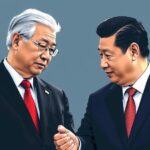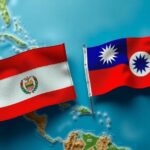Rubio Commends Panama’s Departure from Chinese Infrastructure Initiative
U.S. Secretary of State Marco Rubio praised Panama’s choice to end its participation in China’s Belt and Road Initiative, viewing it as beneficial for U.S. relations. President Mulino confirmed non-renewal of the agreement, responding to U.S. concerns over debt diplomacy. An audit may lead to a review of Chinese port operations near the Canal, allowing for increased U.S. and European involvement.
United States Secretary of State Marco Rubio expressed approval of Panama’s recent decision to allow its participation in China’s Belt and Road Initiative to expire. Rubio stated that this development signifies strengthening U.S.-Panama relations and represents progress for the region. The move is perceived as a response to Washington’s concerns over China’s expanding influence in Latin America, particularly through initiatives characterized as “debt trap diplomacy.”
During his initial overseas visit as Secretary of State, Rubio engaged Panama’s leadership, urging them to reassess their ties with China. President Jose Raul Mulino confirmed that Panama would not renew its involvement in the initiative, indicating the agreement might be terminated ahead of its scheduled expiration in two to three years. Rubio commended the announcement, framing it as a reflection of effective U.S. leadership aimed at protecting national security.
Initially, Panama had joined the Belt and Road Initiative in November 2017, aligning its diplomatic relations with China instead of Taiwan. While Beijing insists that the initiative promotes global development through various infrastructural projects, it has faced scrutiny regarding its significant costs and the repayment burdens on participating countries. Notably, Italy exited the initiative in 2023 amid U.S. pressure.
The U.S. has consistently expressed concerns about certain Chinese operations near the Panama Canal. Rubio relayed a message from President Trump to Mulino, characterizing Chinese presence as a potential threat to critical infrastructure and a breach of U.S.-Panama treaty obligations. Subsequently, Mulino exhibited openness to reviewing the long-term concession awarded to CK Hutchison Holdings for port operations, provided the results of an audit support this action.
Ryan Berg of the Center for Strategic and International Studies noted that should the audit indicate corrupt practices in the agreements, Panama may be positioned to revoke the concessions and invite new bids from American or European companies. This scenario underscores Panama’s efforts to reclaim control over its strategic waterways and restore its sovereignty amid international concerns about Chinese influence.
The Belt and Road Initiative (BRI), spearheaded by China, aims to enhance global infrastructure development through investment and cooperation. However, it has been criticized for potentially enslaving participating countries in debt through high-interest loans. Countries like Panama, which initially endorsed the BRI, are reevaluating their involvement due to U.S. influences and apprehension regarding China’s broader intentions in the region.
In summary, Panama’s decision to exit the Belt and Road Initiative marks a pivotal moment in U.S.-Panama relations, reflecting heightened vigilance over Chinese economic influence in Latin America. The anticipated audit of Chinese-linked port operations at the Panama Canal could further reshape the dynamics of international partnerships, allowing for potential Western engagement in this strategically significant area.
Original Source: www.usnews.com








Post Comment